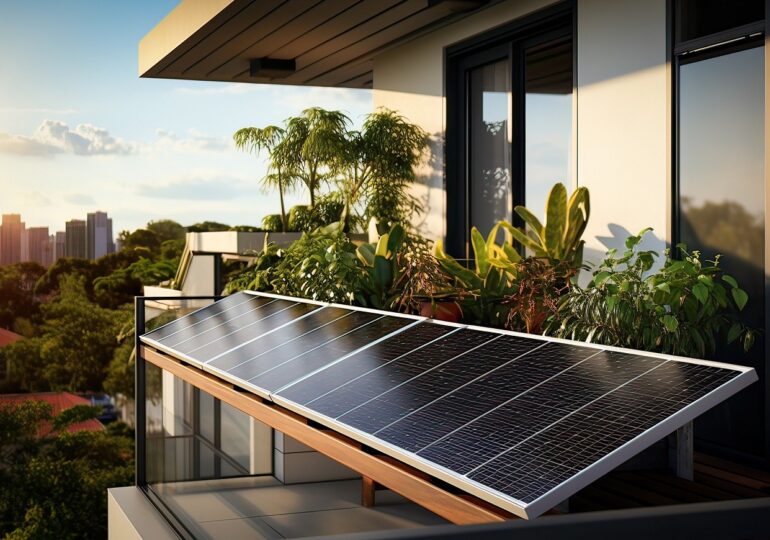A new wave of products for capturing solar energy not only offers cheap energy but also attracts new users to the energy transition process.
Almost half a million plug-in solar systems are installed in Germany, most of them perfectly placed on building balconies.
According to the latest data, only in the first quarter of this year, 50,000 new photovoltaic devices were installed. This boom stems from Germany's "very strong solar culture," according to an expert consulted by Euronews.
Solar balconies are just one element of the broader solar transition process in Europe, explains Jan Osenberg, policy consultant at SolarPower Europe. "We consider them as elements of solar roofs, but also something different. Essentially, we view them as a trend for all possible solar energy generation infrastructure," he points out.
The list of suitable structures for plug-in solar panels includes trains, highways, parking lots, car ceilings, building facades - almost any structure can capture solar energy.
How a solar balcony works
The main element that sets solar balconies apart from solar roofs is the size. In principle, balcony systems consist of one or two panels that connect to an outlet.
These units produce about 10% of the energy provided by traditional photovoltaic panels mounted on rooftops.
Osenberg estimates that Germany has a capacity of approximately 200 MW from solar balconies, compared to the 16 GW combined from solar panels on residential building roofs.
For an average customer, the main difference is that the photovoltaic panel for the balcony is much easier to install: you buy the kit online and don't need an installer to mount it, unlike roof panels that only authorized technicians can install to avoid fire risks.
In short: the panels need to be placed on a mounting structure, then connected through cables attached to an inverter that converts the energy from direct current (DC) to alternating current (AC), the type of electrical energy used in households. The current is transferred to the outlet through a regular plug.
Why solar balconies are successful
"The main reason for the success of these systems is that they offer people who did not have this possibility before the chance to use solar energy," explains a representative of the German manufacturer Meyer Burger.
"Most people do not own a home or cannot install solar panels on the roof due to heritage protection laws, shading, or other roof construction conditions. For them, the solar balcony is attractive because they can use solar energy to produce their own electricity and reduce their energy bills," he adds.
Germany is one of the first countries to invest in solar technology, and now it has the largest solar energy production in Europe.
However, apartment buildings have entered this widespread phenomenon later. This is because the decision to install photovoltaic panels on the roofs of buildings depends on the agreement of all tenants, and the distribution of electric energy between apartments is difficult.
"With solar balconies, though, suddenly it's very, very easy. All these people who couldn't have solar energy in the last ten years now have access to it," explains the Meyer Burger representative.
Solar balconies also have other significant advantages:
- these solutions come with batteries for storing the produced energy, which are mounted between the panel and the inverter. The batteries are smaller than those for roof panels but provide enough energy for users who are away during the day and return home in the evening.
- some systems have applications that can be installed on your phone and show how much energy the system produces and how much of the needed energy it covers.
- the user does not have to be a homeowner to install photovoltaic panels on the balcony: if they move, the renter does not lose the investment but takes it with them.
However, although it does not require installation by an authorized installer, the system weighs 24 kilograms. Therefore, it is crucial to follow the installation instructions and conditions to avoid its falling from a height.
Subsidies also matter
In the early 2000s, Germany took the lead in the solar energy sector. The government encouraged people to get involved by offering a fixed price for each unit of energy sent to the grid.
Reducing bureaucracy, eliminating VAT, and providing subsidies gave additional boosts to this market.
Subsidies are applied at a regional level. In Berlin, they amount to 500 euros, covering almost half of the kit's cost. The investment is recovered in about three years, says Osenberg.
Balcony solar panels have a lifespan of about 20 years, making them a very attractive investment. According to market data records, in North Rhine-Westphalia, over 80,000 plug-in solar panels have been installed, followed by Bavaria with over 60,000 and Lower Saxony with over 50,000.
The size of solar balcony systems is continuously growing and is heading decisively towards four panels, Osenberg adds.
Other countries still have a lot to learn
The EU believes that member states can contribute to the adoption of solar balcony solutions; however, since it is not mandatory, not all countries embrace it. Belgium has even banned them, fearing the impact that unregistered or improvised systems could have on the power grid.
Network operators want to monitor the power supply, as sudden changes can lead to a power outage. "But in our opinion, this is not really a problem because the introduction of power from the balcony system is so small that the impact would also be quite negligible," Osenberg believes.
Austria, France, Italy, Poland, and Luxembourg have taken a favorable stance on solar balconies, and renewable energy supporters in Spain are trying to persuade the government to relax the rules soon.
T.D.

